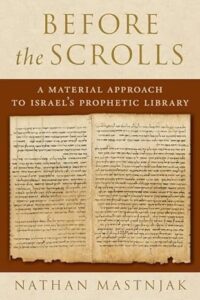MASTNJAK, N. Before the Scrolls: A Material Approach to Israel’s Prophetic Library. New York: Oxford University Press, 2023, 264 p. – ISBN 9780190911096.
Before the Scrolls traça a história da mídia do corpus profético bíblico para propor uma abordagem material da literatura bíblica. Embora os estudiosos entendam que o material de composição foi o pergaminho e não o códice, eles persistem em imaginar a sua forma como um único objeto textual. Essa suposição permeia séculos de estudos e motiva muitas das questões feitas sobre a composição bíblica.
material de composição foi o pergaminho e não o códice, eles persistem em imaginar a sua forma como um único objeto textual. Essa suposição permeia séculos de estudos e motiva muitas das questões feitas sobre a composição bíblica.
Nathan Mastnjak levanta a questão do formato físico original dos textos bíblicos e argumenta que muitas das obras literárias que eventualmente se tornariam os livros proféticos da Bíblia não foram escritas inicialmente como livros. Isaías, Jeremias e Ezequiel foram originalmente compostos em coleções vagamente organizadas de vários rolos e folhas curtas de papiro.
Embora raramente considerados nos estudos, a realidade da forma, formato, produção e substância material de um texto tem uma influência profunda no significado do texto. Diferentemente das obras comprometidas com pergaminhos de livros únicos, essas coleções não tinham uma ordem de leitura pré-determinada e eram suscetíveis a múltiplos arranjos. Somente na era helenística essas composições foram editadas, organizadas e copiadas em pergaminhos de volume único, como os conhecidos Manuscritos do Mar Morto.
Ao investigar a relação entre forma e significado e a transição da coleção para o livro, Mastnjak sugere novas soluções para problemas clássicos dos estudos bíblicos, como as relações entre o TM e a LXX de Jeremias e entre o Primeiro e o Segundo Isaías. A falha em levar em conta a materialidade do corpus profético levou os estudiosos a ocasionalmente fazer perguntas erradas sobre essas composições e cegou-os para o papel vital que os editores desempenharam na criação da Bíblia como a conhecemos. Reformular grande parte da literatura judaica num modelo de coleção, em vez de um modelo de livro, tem implicações significativas para a nossa compreensão de como a própria Bíblia foi composta e lida.
Nathan Mastnjak é professor de Sagrada Escritura no Seminário Notre Dame em Nova Orleans, Louisiana e autor de Deuteronomy and the Emergence of Textual Authority in Jeremiah.
Há uma boa resenha publicada por Ethan Schwartz em Ancient Jew Review em 17 de abril de 2024.
 Before the Scrolls traces the media history of the biblical prophetic corpus to propose a material approach to biblical literature. Although scholars understand that the material of composition was the scroll rather than the codex, they persist in imagining the form as a single textual object. This assumption pervades centuries of scholarship and drives many of the questions asked about biblical composition. Nathan Mastnjak raises the question of the original physical format of biblical texts and argues that many of the literary works that would eventually become the Bible’s prophetic books were not written initially as books. Isaiah, Jeremiah, and Ezekiel were originally composed on loosely organized collections of multiple short papyrus scrolls and sheets. Though rarely considered in scholarship, the realia of a text’s form, format, production, and material substance have a profound influence on the meaning of the text. Unlike works committed to single book-scrolls, these collections did not have predetermined orders of reading and were susceptible to multiple arrangements. Only in the Hellenistic era were these compositions edited, organized, and copied into single volume book-scrolls such as those known from the Dead Sea.
Before the Scrolls traces the media history of the biblical prophetic corpus to propose a material approach to biblical literature. Although scholars understand that the material of composition was the scroll rather than the codex, they persist in imagining the form as a single textual object. This assumption pervades centuries of scholarship and drives many of the questions asked about biblical composition. Nathan Mastnjak raises the question of the original physical format of biblical texts and argues that many of the literary works that would eventually become the Bible’s prophetic books were not written initially as books. Isaiah, Jeremiah, and Ezekiel were originally composed on loosely organized collections of multiple short papyrus scrolls and sheets. Though rarely considered in scholarship, the realia of a text’s form, format, production, and material substance have a profound influence on the meaning of the text. Unlike works committed to single book-scrolls, these collections did not have predetermined orders of reading and were susceptible to multiple arrangements. Only in the Hellenistic era were these compositions edited, organized, and copied into single volume book-scrolls such as those known from the Dead Sea.
By investigating the relationship between form and meaning and the transition from the collection to the book, Mastnjak suggests novel solutions to classic problems in biblical scholarship, such as the relationships between the MT and LXX of Jeremiah and that between First and Second Isaiah. The failure to account for the materiality of the prophetic corpus has led scholarship to occasionally ask the wrong questions of these compositions and has blinded it to the vital role that Hellenistic bookmakers played in the creation of the Bible as we know it. Reconceiving much Judean literature on a collection-model rather than book-model has significant implications for our understanding of how the Bible itself was composed and read.
Nathan Mastnjak is Professor of Sacred Scripture at Notre Dame Seminary in New Orleans, Louisiana and author of Deuteronomy and the Emergence of Textual Authority in Jeremiah.